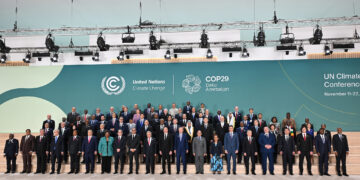Gabon recently executed a “debt-for-nature” swap worth $436 million, aiming to support marine conservation. Gabon, situated in Central Africa, possesses coastlines and marine territories that harbour the largest population of endangered leatherback turtles, along with Atlantic humpback dolphins, manatees, and sawfish. In the past week, the nation repurchased $436 million of its global bonds. Subsequently, it restructured the debt into a fresh $500 million “blue bond,” featuring a reduced interest rate and extended maturity. This transition, finalized on Tuesday, is projected to yield $163 million dedicated to marine conservation initiatives within the forthcoming 15 years.
In its simplest form, debt-for-nature swaps involve a country’s debt being acquired by a financial institution or specialized investor, then replaced with more affordable loans, frequently facilitated by a “credit guarantee” or “risk insurance” linked to development financing, thereby reducing the financial burden. The funds saved are intended to support conservation efforts.
The agreement by Gabon was long-awaited, and its formalization occurred just before the scheduled presidential elections later this month. President Ali Bongo, contending for a third term, highlighted that this swap marks a significant milestone for environmentally conscious financial arrangements in Africa. He conveyed this sentiment via an emailed statement, expressing, “All too often, discussions about these innovative mechanisms to reward countries like mine remain theoretical. In this instance… we have transformed it into a reality.”
The Nature Conservancy, a non-profit organization based in the U.S. that guided Gabon’s government throughout the process, praised the deal for addressing biodiversity, climate, and debt concerns simultaneously. Slav Gatchev, the head of sustainable debt at the organization, indicated that they have also collaborated with Belize and Barbados. The organization foresees being involved in one to three similar agreements annually until 2030. While Gatchev refrained from specifying countries, he suggested that the ecologically supportive swaps they advise on could amount to $10 billion by the end of the decade.
This year, the enthusiasm surrounding debt-for-nature swaps surged following Ecuador’s landmark $1.6 billion swap in May. This move liberates $18 million annually for the Galapagos Islands, which famously inspired Charles Darwin’s theory of evolution.
From a fiscal standpoint, the new bond’s 6.097% interest rate is deemed advantageous by Andrew Stanners, an investment director at Abrdn, an emerging market investment firm that holds Gabon’s existing bonds. This rate is significantly lower than the 9-10.5% yield observed in other bonds.
To enhance the creditworthiness of Gabon’s new “blue bond,” the U.S. Development Finance Corporation offered risk insurance, leading Moody’s to award it an Aa2 investment-grade rating – a considerable advancement from the government’s own “junk” Caa1 rating. A portion of the savings will be allocated to an investment fund designed to perpetually support conservation endeavours. The government also intends to allocate approximately $5 million per year to combat illegal fishing and fulfil its commitment to safeguard 30% of its coastal waters.
Source: Reuters





